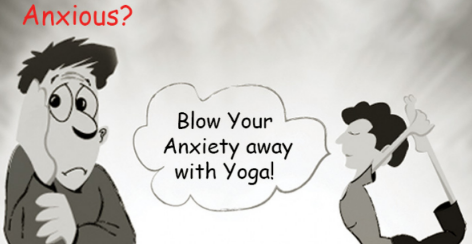Do you want to know about yoga therapy for mental health? Well, nowadays, there is a growing interest in yoga. While practicing yoga, which generally combines with physical postures, breathing exercises, and meditation techniques, its effectiveness has been proven for managing mental health conditions.
Whether you are suffering from anxiety, depression, PTSD, or stress, yoga therapy offers many benefits that traditional therapies have failed to do. Aren’t you aware of how it works for mental health? Then no need to worry! In this blog, we will help you figure out how yoga therapy can enhance mental health care, its benefits, and how professionals can incorporate it into their practices. So, are you ready? Let’s dive into this informative blog now!

Yoga Therapy: Get Familiar With It!
Before going forward to the importance of yoga therapy in mental health, let’s get familiar with its meaning. Doing so will help you know the deeper aspects of its importance.
Yoga therapy is a personalized approach to using yoga postures, breathing exercises, and meditation to treat diseases or promote overall health. While there are regular yoga classes, therapy is more personalized and caters to clients suffering from specific health complications, such as mental illness.
Moreover, it concentrates on the mind and body with touch with yoga ideas to stabilize the activities of the nervous system and anxiety and encourage mindfulness. Mental health professionals can think creatively about how yoga therapy can integrate their traditional approaches into clinical practice, such as talk therapy or medication
The Role of Yoga Therapy in Mental Health
So, here is the importance of yoga therapy that helps in improving the overall health. Go through how it works for different factors and makes you feel stable, happy, and mentally fit.
Reduces Anxiety and Stress
It is important to note that yoga therapy has an impact on lowering the levels of anxiety and stress. Pranayama, part of yoga, involves the slowing down of breath; this assists in calming the nervous system, thus making you relax. However, carried out in routine sessions, yoga therapy helps reduce stress and establish calmness in the body.
In particular, personal yoga therapy techniques focus on deep, slow breathing, which can stimulate the parasympathetic nervous system, referring to the “rest and digest—calming system,” to alter the body’s fight or flight response.
Alleviates Symptoms of Depression
Well, depression is associated with some of the symptoms, such as low mood, feelings of unhappiness, loss of interest in life, and energylessness. These symptoms have a natural treatment through yoga therapy. It also boosts endorphins in the body—the body’s feel-good chemicals—thereby reducing feelings of sadness and enhancing mood.
Yoga asanas, together with the use of pranayama techniques, promote blood circulation, more effective neural impulses, and less physical tension. These changes in the physical structure might help bring about improved feelings of well-being, which is something very important for anybody who has depression.
Enhances Mindfulness and Emotional Regulation
One of the core aspects of yoga therapy is attending—paying attention to the present experience in a non-critical way. It creates awareness of self-thoughts and feelings and how to deal with them as opposed to reacting uncontrolled. In mental health treatment, mindfulness can be an effective mechanism for handling mental disorders such as PTSD, anxiety, and bipolar disorder.
Another benefit is that clients get to learn how to control their emotions and their reactions so as to avoid getting overwhelmed by an incident. Yoga therapy assists patients in gaining insight into their body and mind, hence enabling them to develop appropriate coping mechanisms for stress.
Supports Healing from Trauma
Yoga therapy techniques have widely been accepted as being useful in helping deal with trauma. Trauma-informed yoga is aimed at helping the clients establish control, self-regulation, and shared decision-making to facilitate their self-healing process. It teaches you to take time to focus on yourself without judgment, which is a boon for those in the process of healing from PTSD or trauma.
In yoga therapy, clients are guided through a process of gradually regaining control over both their bodies and emotions to feel more secure in their own skin.
Improves Sleep Quality
Depression and anxiety are some of the mental disorders well associated with inadequate sleep. Yoga therapy can improve the quality of sleep by making a body less stiff and by easing the thought process before going to bed. Yoga movements are particularly beneficial for our circulatory system; gentle asana with relaxation practices helps the body transition to sleep and stay asleep.
Yoga helps those with sleeplessness or poor sleep by enhancing energy, improving sleep quality, or reducing nighttime wake-up calls. It also came out clearly that yoga therapy can supplement the conventional treatment of sleep disorders in mentally ill patients.
In case you are suffering from weight gain and looking for a pre- and post-workout diet, then click here

How Can Professionals Integrate Yoga Therapy into Mental Health Care?
Mental health professionals who are interested in practicing yoga therapy in their practice have several ways of going about it. Below are some practical suggestions:
Collaborate with Certified Yoga Therapists
Even though mental health professionals can be aware of the benefits of yoga. However, working with a certified yoga therapist who works with mental health patients will offer better integration. Such therapists are taught just to treat clients with different mental disorders, adjusting yoga practices for them.
Educate Patients about Yoga Therapy
Recommend that patients who are suffering from mental illness try yoga therapy. You might also assist them with other, more conventional treatments and how they can improve their quality of life. Introducing the patient to local classes in yoga therapy or finding a certified yoga therapist is quite beneficial. It may make the patient interested in trying this complementary technique.
Offer Simple Yoga Practices
Remember to include even the most basic of the yoga practices in your sessions. Practical relaxation, some basic stretching techniques, and elements of focus awareness can be introduced into a single session or as a series of therapeutic sessions. However, use these particular movements with clients to help them cope with their feelings, calm down, and decrease their level of anxiety.
Monitor Progress
Like any therapy, it’s always important to evaluate the outcome of your clients. Learn from their reactions regarding yoga therapy, then modify the exercise. Over time, you will realize that some clients will drastically experience enhanced mental health due to the effects caused by yoga therapy.
However, if you are also looking for the best ways to stay fit and healthy regardless of your routine, then click here.
Conclusion
Yoga therapy is an extremely viable treatment method that addresses all the mental aspects of a patient. Yoga is effective for stress reduction, increasing awareness, increasing positive emotions, and trauma healing. For professionals, yoga therapy in mental health can be a strong part of the treatment plan that supports traditional therapies. Thus, it gives their clients a holistic approach to recovery and enhanced living.




2 thoughts on “The Importance of Yoga Therapy in Mental Health: A Professional’s Guide!”
Did anyone know about it ? Research suggests that yoga therapy can be beneficial for individuals experiencing various mental health issues, including depression, anxiety, stress, trauma, and addiction. It offers a holistic approach that addresses the mind, body, and spirit, facilitating overall well being.
Intriguing insights on the role of yoga therapy in mental health care! How have you seen the integration of yoga positively impact mental well-being in clinical settings?